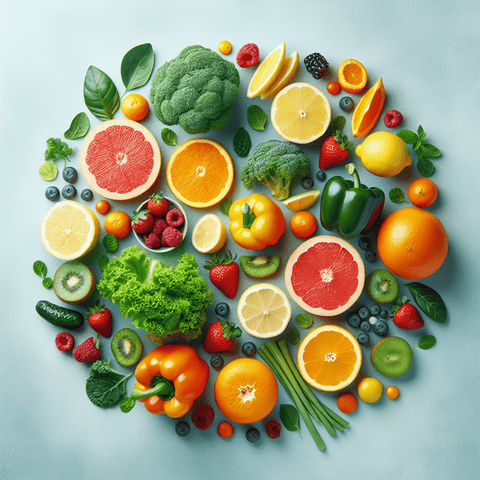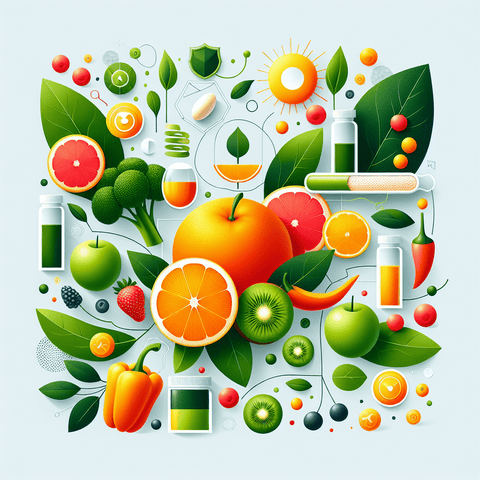Introduction
Vitamin C, scientifically known as ascorbic acid, is one of the most essential nutrients our bodies need to function optimally. It plays a pivotal role in various physiological processes including the synthesis of collagen, a protein that maintains skin elasticity and wound healing; it also aids in the absorption of iron from plant-based foods and offers significant antioxidant protection. Moreover, vitamin C is integral in supporting immune function, helping the body fend off illnesses and recover from infections more effectively.
The human body cannot produce or store vitamin C, meaning it must be obtained daily through food or supplements. This makes the regular consumption of vitamin C-rich foods or a quality vitamin C supplement crucial to maintaining optimal health and well-being. With its multifaceted benefits, from enhancing immune defense to reducing oxidative stress, incorporating an adequate amount of vitamin C into your diet is a non-negotiable part of holistic nutrition and modern wellness strategies.
In this comprehensive guide, we will explore the top foods that are high in vitamin C, categorize them based on their specific health contributions, and demonstrate how a diet rich in these foods, possibly augmented by supplements, can uplift your immune system, skin health, and overall vitality. We’ll also introduce some of the best products from Topvitamine.com to help you achieve your nutritional goals.
Vitamin C Foods Relevant to Nutritional Supplements
While supplements offer a convenient way to meet daily nutrient requirements, they should ideally work in tandem with whole foods to support maximum nutrient absorption and biological effectiveness. Natural sources of vitamin C — namely fruits and vegetables — provide a complex matrix of phytonutrients, fibers, and enzymes that improve vitamin C bioavailability and utilization by the body. Consuming these foods regularly not just elevates vitamin C intake but also facilitates a richer, synergistic nutrient profile that standalone supplements might not deliver.
Some of the most effective dietary sources of vitamin C that complement supplement intake include citrus fruits like oranges, grapefruit, and lemons, as well as strawberries, peppers, and leafy greens. These foods lay a strong foundation for health while allowing supplements to fill in any nutritional gaps. For instance, if you’re following a restrictive diet, have malabsorption issues, or are living in a region with limited access to fresh produce, a quality supplement becomes essential.
When choosing a vitamin C supplement, it's important to consider the form and dosage. Products that incorporate buffered vitamin C (such as calcium ascorbate) tend to be gentler on the stomach, especially at higher doses. Liposomal vitamin C formulations offer enhanced bioavailability, making them ideal for individuals needing a reliable boost. You can browse through a wide variety of quality-assured supplements tailored to different needs on Topvitamine.com.
The synergy between whole foods and supplements ensures your body receives both the macronutrient and micronutrient support needed to thrive. This combination helps avert potential deficiencies and ensures you’re maximizing the efficacy of each vitamin C molecule, whether derived from a juicy orange or a potent capsule.
Immune-Boosting Foods Rich in Vitamin C
One of vitamin C’s most recognized roles is its contribution to a healthy immune response. It supports the function of various immune cells and enhances their ability to protect against infections. Regularly consuming vitamin C-rich foods strengthens the skin’s barrier function, supports the oxidative burst that kills pathogens, and aids in the resolution of inflammation.
Among the best immune-boosting foods rich in vitamin C are citrus fruits, bell peppers — notably red and yellow varieties — and cruciferous vegetables like broccoli. Oranges provide about 70 mg of vitamin C per serving, enough to meet or exceed daily requirements. Bell peppers surprisingly surpass oranges in ascorbic acid content, offering upward of 95 mg per half-cup serving. Kale, spinach, and mustard greens are also robust sources, particularly when eaten raw or lightly steamed to preserve nutrients.
Incorporating these foods into daily meals can be straightforward and delicious. Morning smoothies fortified with strawberries, pineapple, and a handful of leafy greens are not only vitamin C powerhouses but also energizing meal starters. Add red bell pepper strips to sandwiches or salads for a crunchy, immune-enhancing bite. Roast broccoli with garlic and olive oil as a flavorful side dish that pulls double duty for health and taste.
During illness or seasonal changes, upping your vitamin C intake through these foods — in combination with supplements from Topvitamine’s vitamin C collection — may reduce the severity and duration of symptoms in otherwise healthy people. Maintaining a well-stocked pantry and fridge with immune-enhancing produce enables you to stay nutritionally prepared year-round.
Vitamin C-Rich Fruits That Support Overall Wellness
Fruits are not only satisfying and sweet but also dense sources of essential vitamins, fiber, and water content that support hydration and digestion. When it comes to vitamin C, certain fruits stand out as nutritionally elite. These include kiwifruit, strawberries, papayas, mangoes, and of course, the iconic orange. Each brings a unique profile of antioxidants and phytochemicals, enhancing the cumulative health benefits they deliver.
Kiwi, for instance, offers nearly 90 mg of vitamin C per medium-sized fruit and contains actinidin, an enzyme aiding digestion. Strawberries provide about 85 mg per cup, along with anthocyanins that support heart and brain health. Papayas deliver over 90 mg per serving and contain papain, another natural digestive enzyme. Pineapple adds bromelain to the mix, known for its anti-inflammatory properties.
These fruits do more than just support the immune system. Regular consumption enhances collagen production for skin integrity, supports gum health, and improves iron absorption, particularly critical for individuals following plant-based diets. Vitamin C also aids in neutralizing free radicals that contribute to aging and chronic illnesses. Incorporating these fruits into your daily routine doesn’t require a complete dietary overhaul. Add kiwi slices to a bowl of oatmeal, include chopped strawberries in Greek yogurt, or snack on orange segments post-workout for a refreshing nutrient boost.
Creating seasonal fruit salads or blending nutrient-packed smoothies allows you to mix and match various vitamin C sources throughout the week. A particularly beneficial approach could involve pairing fruits with fortified supplements from Topvitamine.com to ensure you consistently meet your wellness metrics. This not only enriches your daily nutrient intake but enhances your dietary enjoyment as well.
Natural Sources of Vitamin C for a Holistic Nutrition Approach
Nature provides an abundance of vitamin C-rich foods, many of which are lesser-known but carry exceptional nutritional potency. For those pursuing a holistic, whole-food-centered approach to nutrition, rare fruits like guava, acerola cherries, camu camu, and rose hips can be powerful allies. These foods contain vastly higher concentrations of vitamin C than citrus fruits and offer additional beneficial compounds unique to each variety.
Guava provides up to 228 mg of vitamin C per 100 grams, beating oranges many times over. Acerola cherries are a superfruit with over 1,500 mg per 100 grams, making them a premier choice for those in need of a strong nutritional boost. Camu camu berries are another potent option, packing a punch with up to 2,000 mg per 100 grams. Rose hips, the fruit of the wild rose plant, bring in over 400 mg per 100 grams and are often used in teas and jams.
The advantage of acquiring vitamin C from these whole foods lies in their rich spectrum of co-factors such as bioflavonoids, phenolic acids, and various enzymes, which improve absorption and support cellular function. Unlike synthetic ascorbic acid found in many low-quality supplements, natural vitamin C from whole plant foods offers a more rounded nutritional profile.
Creative integration is key for these superfoods. Try acerola cherry powder in smoothies or oatmeal. Add dried rose hips to herbal teas or use them in homemade jelly. Include diced guava in tropical fruit salads or camu camu powder in yogurt bowls. For those unable to access these exotic items regularly, supplements derived from these fruits can be found in high-quality options through Topvitamine’s product collection.
Choosing real, natural sources of vitamin C as cornerstones of your diet supports a sustainable, plant-powered approach to health and aligns with a lifestyle centered on prevention and vitality.
High Vitamin C Vegetables to Boost Your Daily Intake
While fruits often get top billing in discussions about vitamin C, vegetables present an equally important and sometimes superior source. They are especially vital for those watching their sugar intake or looking to add vitamin C while keeping meals savory rather than sweet. Key high-vitamin C vegetables include broccoli, Brussels sprouts, cauliflower, kale, spinach, and chili peppers.
Broccoli contains around 89 mg of vitamin C per 100 grams and is also high in fiber and antioxidants. Brussels sprouts provide nearly 85 mg of vitamin C per cup and are excellent sources of vitamin K and folate. Kale and spinach offer roughly 80 mg and 28 mg per cup respectively, while maintaining a low-calorie profile. Chili peppers significantly outpace others, with one red chili packing over 100 mg of vitamin C.
Preparation methods are crucial when it comes to preserving the integrity of vitamin C in vegetables. Because vitamin C is water-soluble and sensitive to heat, steaming is preferable to boiling, which can leach nutrients into the cooking water. Light sautéing, roasting, or even eating raw in salads are excellent ways to maximize nutrient retention. Try massaging kale leaves with lemon juice for a refreshing salad, roasting Brussels sprouts with balsamic vinegar, or tossing raw red bell peppers into Mediterranean wraps.
Vegetables also offer a consistent source of vitamin C that can be consumed throughout the day, including at dinner, unlike fruits that are often associated with breakfast and snacks. This ensures a more even distribution of nutrient intake, contributing to better utilization and storage of vitamin C throughout various physiological processes.
Boosting your daily intake with these vegetables, alongside suitable supplementation from vetted sources like Topvitamine.com, secures a steady supply of this essential nutrient regardless of seasonal changes or dietary restrictions.
Antioxidant Foods That Are Also Rich in Vitamin C
Vitamin C acts dynamically within the body as an antioxidant, providing a line of defense against oxidative stress by neutralizing free radicals that can lead to cellular damage. Foods that combine high vitamin C content with robust antioxidant profiles offer double the benefits, contributing not only to immune support but also to long-term wellness, including healthy aging and inflammation modulation.
Some of the standout vitamin C-rich antioxidant foods include strawberries, red bell peppers, tomatoes, spinach, and blueberries. Strawberries, already highlighted for their sweet flavor and vitamin C content, are also rich in polyphenols and flavonoids, particularly ellagic acid, which supports cardiovascular and metabolic health. Red bell peppers, which contain both high vitamin C and carotenoids like beta-carotene and lutein, are great for vision and skin protection.
Tomatoes, rich in lycopene and offering around 20 mg of vitamin C per cup, excel in synergistic antioxidant activity when cooked. Spinach provides vitamin C alongside iron, folate, and additional antioxidants like lutein and zeaxanthin, supporting eye health. Blueberries, though not the highest in vitamin C (~10 mg per 100 grams), offer exceptional anthocyanins and resveratrol that work in harmony with vitamin C to counter oxidative gene damage and tissue aging.
Combining these powerful antioxidant foods in your meals goes beyond preventive care; it reinforces the body's ability to repair, regenerate, and resist chronic diseases over time. Their inclusion promotes longevity, enhances metabolic efficiency, and fortifies cellular resilience. You can supercharge smoothies, salads, and even warm meals by adding combinations of these antioxidant powerhouses daily.
To maintain a consistently high intake of both vitamin C and antioxidants, balanced supplementation from trusted suppliers like Topvitamine’s antioxidant and vitamin C range can further elevate your nutritional regimen, giving you a firm foundation for long-term vitality.
Conclusion
The significance of vitamin C in maintaining human health cannot be overstated. From bolstering our immune system to supporting collagen synthesis, enhancing iron absorption, and combating oxidative stress, this vitamin plays a central role in our well-being. Ensuring an adequate intake through a diet rich in fruits and vegetables, complemented with high-quality supplements, is both a pragmatic and effective approach to safeguarding one's health.
We’ve explored foods that stand out in their vitamin C content and discussed how they fit into daily meals and long-term dietary habits. From citrus fruits and kiwis to broccoli and bell peppers, nature provides a colorful array of powerful nutritional allies. Natural sources such as guava and rose hips offer holistic benefits that go beyond just ascorbic acid, and antioxidant-rich options like strawberries and tomatoes give your body a multi-faceted shield against aging and disease.
To ensure optimal vitamin C levels, quality supplementation can fill the gaps where diet alone may not suffice. Visit Topvitamine.com for premium products that cater to every need, from daily maintenance to targeted immune support.
Call to Action
Which vitamin C-rich foods do you enjoy the most? Explore how you can better integrate these foods into your meals and consider supplement options if needed. Visit our dedicated vitamin C collection on Topvitamine.com to discover tablets, powders, and liposomal formulations tailored for your health goals. Continue your learning journey by reading more about vitamin D, vitamin K, or our range of magnesium-based products.
Q&A Section
Q: What fruits are highest in vitamin C?
A: Fruits like acerola cherries, guava, kiwi, papaya, strawberries, and oranges are among the highest in vitamin C.
Q: Are vegetables good sources of vitamin C?
A: Yes, vegetables like red bell peppers, broccoli, Brussels sprouts, kale, and chili peppers are excellent sources of vitamin C.
Q: Is it better to get vitamin C from food or supplements?
A: Whole foods provide co-factors and better absorption, but supplements are useful for filling gaps. A combination is ideal for most people.
Q: How can I preserve vitamin C content in cooking?
A: Steam vegetables instead of boiling, and cook at lower temperatures for minimal time. Eat fruits raw when possible.
Q: How do I know which vitamin C supplement is right for me?
A: Choose based on your dietary habits, existing health conditions, and personal tolerance. Consider liposomal or buffered options from Topvitamine.com.
Important Keywords
- Vitamin C foods
- Best fruits high in vitamin C
- Vegetables with vitamin C
- Vitamin C supplements
- Immune boosting foods
- Antioxidant-rich foods
- Natural sources of vitamin C
- Holistic nutrition vitamin C
- Topvitamine vitamin C products
- High-vitamin C recipes



